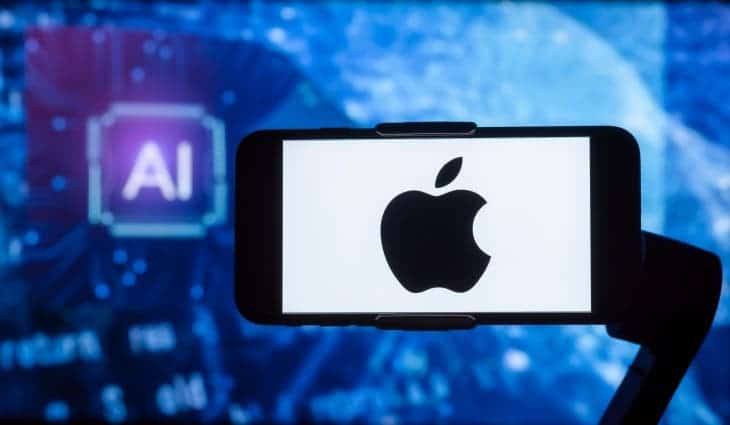Apple is set to unveil its latest AI feature, “Apple Intelligence,” at the upcoming Worldwide Developers Conference (WWDC) on June 10. This feature will integrate into the latest versions of iOS, iPadOS, and MacOS, offering users a range of AI-driven capabilities that will enhance their overall user experience.

Overview of Apple Intelligence
Apple Intelligence is a suite of AI features that aims to streamline various tasks and improve productivity. The feature will be available as an opt-in beta version, allowing users to choose whether to enable it based on their needs. This approach ensures that users have control over how they utilize AI capabilities and can opt-out if they are concerned about privacy or security. The integration of Apple Intelligence into Apple’s products should enhance user experiences and contribute to the growth of the generative AI smartphone market.
The AI function will include features such as converting voice memos into text, correcting photos with AI, and suggesting replies to emails and text messages. It will also enhance Siri with more advanced capabilities, potentially rivalling other AI assistants like ChatGPT. The AI will operate on the device itself, utilizing the neural engine in the A17 chip installed on the iPhone 15, ensuring better privacy and faster response times.
Apple Intelligence will be part of the new iOS 18 operating system, which will work not only on the upcoming iPhone 16 series but also on the iPhone 15 series, iPad, and Mac products. This means that users of these devices will be able to experience the enhanced AI capabilities without needing to upgrade their hardware. The on-device AI approach ensures that data processing occurs locally on the device rather than on the cloud. This way, there is no transfer of user data and this provides better privacy and security for users.
With Apple Intelligence, Apple is entering the generative AI smartphone market, which should grow rapidly in the coming years. Predictions suggest that the share of generative AI mobile phones in total smartphone shipments will increase from 11% in 2024 to 43% by 2027, making Apple Intelligence a key player in this growing market.
AI Features and Functionality
Apple Intelligence will include several AI-driven features that will be integrated into various Apple apps. Some of the key features include:
- Enhanced Photo Editing: AI capabilities will be added to the Photos app, allowing users to remove unwanted objects from images and edit photos with voice commands.
- Siri Revamp: Siri will receive a significant AI-driven upgrade, enabling users to control features and actions within apps using voice commands. This will include tasks such as deleting emails and editing photos.
- Chatbot Integration: Apple has collaborated with OpenAI to develop a chatbot similar to ChatGPT. This chatbot will integrate into Apple Intelligence and OpenAI will support it.
- AI Summarization: An AI summarization function will be added to Safari, generating overviews of articles and web pages. This functionality will also be integrated into text messages and emails.
- Catch-up Feature: A catch-up feature for missed notifications will allow users to review essential information quickly.

On-Device vs. Cloud-Based Processing
Apple Intelligence will utilize either on-device processing or cloud-based processing, depending on the complexity of the task and data privacy considerations. Tasks processing will occur locally, utilizing the device’s processing power and battery life. It will give immediate results because all the processing takes place on the device. Conversely, cloud-based AI processing will work for tasks that require processing large amounts of data. This includes natural language processing (NLP) and intricate analysis.
Technical Requirements
In addition to Apple’s latest devices, Apple Intelligence will support devices with new chips like the A17 Pro chip and the M1 chip or newer. This means that only the latest devices will be able to harness the full potential of Apple Intelligence. However, this is what we know for now. Whether or not Apple will design this feature to support older devices remains under wraps.
Launch and Availability
Apple Intelligence will launch in the latest versions of iOS, iPadOS, and MacOS. The feature will be available as an opt-in beta version, allowing users to choose whether to enable it based on their needs. This approach ensures that users have control over how they utilize AI capabilities and can opt-out if they are concerned about privacy or security.

Conclusion
Apple Intelligence marks a step forward in Apple’s AI capabilities, offering users a range of AI-driven features that will enhance their overall user experience. With its focus on productivity and user control, Apple Intelligence may change the way users interact with their devices. By leveraging its partnership with OpenAI and developing in-house AI models, Apple aims to provide users with a suite of AI-driven features that will enhance productivity, streamline workflows, and offer a more personalized user experience across iOS, iPadOS, and macOS.
The opt-in nature of Apple Intelligence ensures that users have control over their data and can choose to enable or disable the AI features based on their preferences. This approach addresses privacy concerns and allows users to tailor their experience to their specific needs. The on-device processing capabilities of Apple Intelligence, enabled by the A17 Pro and M-series chips, further safeguard user data by keeping sensitive information secure on the device.
The range of AI features introduced with Apple Intelligence, such as enhanced photo editing, Siri’s expanded capabilities, AI-generated emojis, and automatic email categorization, demonstrates Apple’s commitment to improving the overall user experience. These features also have the potential to save users time, increase efficiency, and provide more personalized interactions with their devices.





